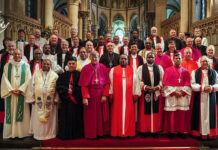Trust. That’s what this was all about. Trust that has collapsed between the Church and survivors of abuse. Trust that has collapsed between Archbishops and clergy, Bishops and Archbishops, dioceses and parishes. There is no trust.
Trust is desperately easy to lose and desperately hard to regain. Trust in Justin Welby over his handling of the John Smyth case was fragile when the story broke in 2017 and shattered in the Makin Report, out last week. When the BBC’s religious affairs editor says that the Archbishop of Canterbury lied on the World at One he confirmed the impression gained by the survivors of the horror of John Smyth’s beating camps that they were being treated with indifference and a worrying lack of truthfulness.
That the Archbishop of Canterbury had to resign is a dark day in the life of the Church of England. He was right to resign because the trust that has been lost over this scandal could never have been restored while he held office — it was clear from so many of the statements of those who had been abused that it was permanently fractured.
But this leaves us with the question of where the church goes now. How do we start the long and slow process of rebuilding trust across so many divides?
The first thing we need is a pastor. Somebody to love the church back to health. With love comes trust, and we need in our Archbishop a person who will be trusted to love — and that this will come across in sermons, synods, public meetings, private meetings, and how they make decisions that will affect parishioners, parishes, and priests.
The first purpose of this love must be to re-earn the trust of the nation that the Church cares about its flock and intends to safeguard them, whatever their age, whatever their physical or mental ability, whatever their background. It must take past sins seriously, and work out ways to minimise the chance of present sins being perpetrated. This isn’t just a question of what will or won’t work, it is just as importantly a question of what will be seen to work. That is how we might win back the trust of so many who have been alienated from the church by the actions and inactions of so many. Winning back the trust of the survivors of clerical abuse is of vital importance to the soul of the church. We must make sure that they are able to play a full part of this process.
The need for pastoral love also applies to the Church itself. There has been a collapse of trust in the Church and its management by Anglicans across the spectrum of theologies and beliefs. Different people had different breaking points, but I think these are some of the main causes. Inevitably the tortured debates about blessing gay unions has done some of the work, on both sides. Gay clergy being apologised to for their mistreatment one minute, then being told they would still face disciplinary sanction for being in a relationship the next; traditionalists being told the proposals do not change the doctrine of marriage one minute, then seeing the Archbishop change the doctrine of marriage on a podcast the next. People of faith and none were horrified by the closure of churches during lockdown and the speed with which this was embraced by the church. The way in which church leaders speak about the Church of England — its history, liturgy, traditions, and, most of all, its people — has often given the impression that the current management is at best embarrassed and often hostile to the church they have chosen to lead.
Read it all in The Critic










